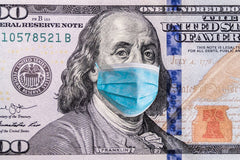Your cart is currently empty.
Free shipping on orders over $50

- Jul, 08 , 21
- 0 comments
How to Sanitize Money?
Contents
Infectious diseases have been a major topic of conversation since the coronavirus pandemic began to sweep across the globe at the beginning of 2020. Naturally, the subject of handling money has become increasingly pertinent, as the virus may be caught by touching an infected surface or object. Questions such as “can you wash money?” are being asked more frequently by individuals as they move towards contactless payment options in this new world of social distancing, hand sanitizer, and hyper-vigilance around germs.
To enhance your cash management efficiency, consider our advanced bill counting machine. It significantly reduces staff time spent on cash-related tasks, streamlining your processes and minimizing transaction errors, ensuring greater precision and reliability.
The Importance of Cash Disinfection Today
The average lifespan of paper money is anything from four to fifteen years. This is plenty of time for a variety of germs to accumulate, and to circulate among those handling paper bills regularly. Studies have revealed that paper notes contain viruses and bacteria, and can cause the spread of diseases. The World Health Organization has advised consumers to wash their hands after handling money.
How to Disinfect Cash
Here are a variety of techniques regarding how to sanitize money. This includes bills and coins:
Washing banknotes
The majority of banknotes used worldwide are made of paper, making them difficult to clean without being damaged. Be aware that placing notes in the washing machine may damage security features and affect the accuracy of the bill if it is later fed into a counterfeit detection machine. Let the notes air dry by placing them in the sun, where the ultraviolet (UV) light emitted by the sun will help to disinfect them. Alternatively a cloth may be used to dry banknotes after you have washed them. UV disinfection cabinets may also be used to quickly and safely disinfect notes without the risk of any being damaged. Recent studies have revealed that the SARS-CoV-2 strain, along with other coronaviruses, may be killed by ultraviolet light rays. Portable UV sterilizers are also an option if you wish to disinfect hard-to-reach spaces or objects that you might encounter when you are leaving the house.

Washing coins
You will need liquid dishwashing soap, a dish towel, tap water, and a small bowl when washing coins. Firstly, determine how dirty the coin is before you begin washing it. If the dirt on the coin is only superficial and can be easily rinsed off, then that is all you will need to do. Rinse the coin in lukewarm water and leave it out to dry. If the coin requires a more intensive wash, boil a cup of hot water and add it to the small bowl mentioned above. Add a teaspoon of dish soap to the hot water and mix until the dish soap has completely dissolved. Place your coins in the solution and let them soak for a few minutes. If soaking multiple coins at a time, ensure that they do not scratch each other when being placed into the solution. To avoid this occurring, wash each coin individually. Move the coin/s around quickly in the soapy water to erase any stubborn dirt that might still be clinging onto the surface. Avoid scratching dirt off as it could also damage the coin. Never touch the face of the coin, always grip it around the edges. After it has been cleaned, rinse the coin in distilled water to prevent any spots forming that are caused by hard water. It is recommended to let the coins air dry, but if that is not an option, dab them gently dry with a dishtowel.

Dipping coins
This is an option if you have coins that are already clean, but you would like to make them a bit shinier. Dip the coins in jewelry cleaner for no longer than two minutes.
Soak coins in an olive oil bath
This is useful for stains that are particularly stubborn. Soak your coin/s with a tablespoon of olive oil in a sealed container, covering them completely with the oil. This process can take days or months to complete, but in the end, will have removed any pieces of dirt embedded into the recesses of the coin.
Clean Cash Solutions for Businesses
Businesses, particularly small ones, are feeling the impact of the COVID-19 pandemic. Many are only willing to accept credit card payments to help mitigate the spread of the virus via cash. However, not all businesses can subsist solely on contactless payments as they do not always have the necessary infrastructure. Small businesses are particularly reliant on cash payments and have no choice but to continue with them. Reliable and efficient money counting machines are a great way to reduce how often you have to touch cash. There are also sterilizer machines on the market that come in a variety of shapes and sizes and can disinfect a variety of objects, including cash.
Conclusion
Sanitizing bills and coins is more important than it has ever been before. A variety of different techniques ensure that it is an inexpensive and relatively quick process. Advanced machines are also available to make the sanitization and money handling process even more efficient.
Search
Custom Menu
Recent Post
Archive
- April 2022
- September 2021
- July 2021
- February 2021
- December 2020
- September 2020




